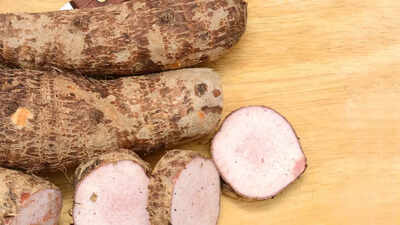ARTICLE AD BOX

If you’ve ever come across the word arbi and wondered what it means, you’re not alone. Arbi, known in English as taro root, is a starchy, underground vegetable enjoyed across Asia, Africa, and the Caribbean.
Though it looks like a small, brown, fuzzy potato on the outside, it holds a creamy texture and nutty flavour inside that makes it incredibly versatile in the kitchen. Beyond taste, arbi offers numerous health benefits, making it a smart addition to your diet. Whether boiled, roasted, or added to curries, this humble root has far more to offer than meets the eye.
What is arbi (Taro root)
Arbi or taro root is a starchy tuber that grows underground and has been enjoyed by cultures worldwide for centuries.
Its pale, creamy flesh and nutty flavour make it a versatile ingredient that can be boiled, fried, mashed, or added to stews. But what makes arbi special isn’t just the taste, it’s the range of health benefits packed inside this root.
Why you should add arbi to your plate: Health benefits that matter
1. Aids digestive health: One of the main benefits of arbi is its high fibre content, which helps maintain healthy digestion. Fibre adds bulk to stools, promoting regular bowel movements and preventing constipation.
A well-functioning digestive system also supports better nutrient absorption and reduces the risk of digestive disorders.2. Supports heart health: Arbi is a good source of potassium, a mineral essential for maintaining healthy blood pressure levels. Potassium helps balance the effects of sodium and eases tension in blood vessel walls, reducing the risk of hypertension and heart disease. Eating potassium-rich foods like arbi can be an effective part of heart-friendly dietary habits.3. Boost your immunity: Thanks to antioxidants found in arbi, your body gets an extra shield against harmful free radicals. This support means your immune system can work more effectively to keep common illnesses at bay.4. Steady energy for your busy day: Unlike sugary snacks that give you a quick rush and then a crash, arbi provides slow-releasing energy. This means you’ll feel energised for longer, perfect for powering through work, study, or workouts.5. Strong bones and muscles: Arbi also contains minerals like magnesium and calcium that are essential for bone strength and muscle function. Eating arbi regularly may support your mobility and overall body strength as you age.6. Fighting inflammation naturally: Chronic inflammation is linked to many health problems, but nature offers help in arbi. Some compounds in taro root have anti-inflammatory properties, which might help reduce discomfort and protect your body long-term.
How to enjoy arbi
The great thing about arbi is that it’s incredibly versatile. Here are some ways you can enjoy it:
- Boiled or steamed: Simply cook until tender and season with salt and herbs for a comforting side dish.
- Taro chips: Slice thinly and fry or bake for a crunchy snack that rivals regular potato chips.
- Curries and stews: Add chunks of arbi to your favourite curries or soups to soak up all the spices and flavours.
- Mashed arbi: Like mashed potatoes, but with a nuttier taste- try mixing with butter and garlic for a creamy delight.
- Soups: Add it to broths for a hearty texture and subtle sweetness.
Important tips: What you need to know before eating arbi
Raw arbi contains tiny needle-like crystals called calcium oxalate, which can irritate your mouth or throat. That’s why always cook it well before eating. Boiling, steaming, or frying will break down these crystals and make it safe and delicious.If you have a history of kidney stones, it’s best to eat arbi in moderation because of its oxalate content.Also read | Is eating avocados daily safe? The possible allergies and digestive side effects you must know



.png)
.png)
.png)
















 3 hours ago
4
3 hours ago
4









 English (US) ·
English (US) ·